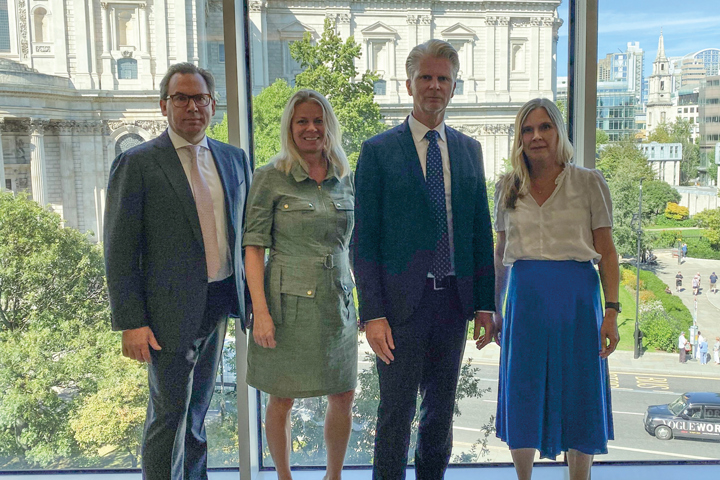
It's all about geopolitics
4 October 2023
Guest Column: Johan Sjöberg
Geopolitics is hardly a new phenomenon. It has been the rule, albeit with some glimpses of openness, for decades. Europe's colonial past, the Cold War between East and West, the more recent Chinese Belt and Road Initiative and most recently Russia's unmitigated war of aggression against Ukraine are just a few but explicit examples. With the Russian aggression, which to be honest shouldn’t have been a big surprise to anyone, geopolitics has once again come to characterise and effect international relations. Within the government policies in Europe as well as within the business community, some twenty to thirty years of Chamberlain-ish sunshine thinking has abruptly come to an end. The realpolitik has been given new points of departure where considerations of given circumstances and factors now equals explicit ideological notions and traditional power politics. This is not something which only affects foreign policy or security policy. The idea or notion that international relations can be separated between government affairs and business interests is naive and counterproductive for anyone who would like to be prosperous in navigating in trade or any other policy area.
To be successful within trade policy, economic policy, climate policy, foreign-, security-, and defense policy, the realisation of how policy fields are interconnected is a must. This puts new demands on governments, authorities, and businesses. A deeper understanding of how geopolitics and security policy integrate with all other policy areas has become a necessity. We may like it or dislike it, but it is simply something we all must accept and deal with. This does not mean that we all should knock on open doors. It does not mean that we all have to be experts in all policy fields. But it does mean that we need to be much better at understanding the context in which we work.
The former US Secretary of Defense Donald Rumsfeld once stated we need to be prepared for both “the known unknowns; that is to say we know there are some things we do not know. But there are also unknown unknowns—the ones we don't know we don't know. And if one looks throughout the history of our country and other free countries, it is the latter category that tends to be the difficult ones”. Maybe we don’t need to go as far as trying to figure out the unknown unknowns but we surely need to move in that direction. States as well as the private sector have to prepare for challenging times in a completely different way than in the past. For companies, a deeper understanding of how their business works in a new context is of profound importance. This includes keeping track of supply chains and supply flows as well as end user of export products, increased security protection and understanding of risks and vulnerabilities. Cyber – and information security as well as physical protection must become part of all companies’ continuity planning. Disinformation campaigns, cyber-attacks, deliberate disruptions in infrastructure, etc. is not a scenario in the future but a real threat here and now.
When countries or associations of countries experience an increased threat, the typical response is increased regulations, increased control, and intervention into the market. Based on good intentions and a belief in its necessity but hardly ever deriving from a close dialogue with the business community. Government affairs, it seems, should not be coloured by the views of the market. This, however, does not mitigate the risks and threats. Instead, it will make it more difficult for companies to contribute to the resilience of a society due to increased regulatory burdens, less profit, and reduced incentives for investments.
In Sweden, the concept of Total defence was re-started a few years ago. This whole-of-society-approach is certainly the right way to proceed and promising steps have been taken. Today, no politician in Sweden is questioning that privately owned companies own and are responsible for many of the most important societal functions, regardless of whether it is a peacetime crisis or wartime supplies. At this year’s public event in Almedalen, the Swedish minister of civil defense, Carl-Oskar Bohlin, stated that there is not one single task that the Swedish total defense system can resolve without the participation of the business community. This manifests itself in the absolute immediacy and urgency that we are seeing in Ukraine right now, for example when it comes to delivery of all kinds of material, including for the defense such as ammunition.
The role of companies in Sweden's crisis and war preparedness is central, and the business community must be a part of preparedness planning to a much greater extent. This however can only be done with a much closer cooperation and dialogue than the one we have today. It is not a question about how the business community can contribute to the total defence system. The business sector is already at the core of the system. Business is a prerequisite for society's development, ability and prosperity, i.e. the foundation of a robust society. Investments and trade flows must be able to be maintained and developed. Basic issues such as the division of responsibilities and financing of business' increased role in crisis preparedness and total defense must be taken seriously. The threat picture is broader and more complex than ever. Building a resilient society requires a joint approach. Now is the time to do it.
Johan Sjöberg, Security and Defense Policy Advisor, Svenskt Näringsliv
Foto: Ulf Börjesson/Ernst Henry Photography AB



Let's stay connected
and keep up-to-date with the Chamber's news and events.
Read our Privacy Policy here